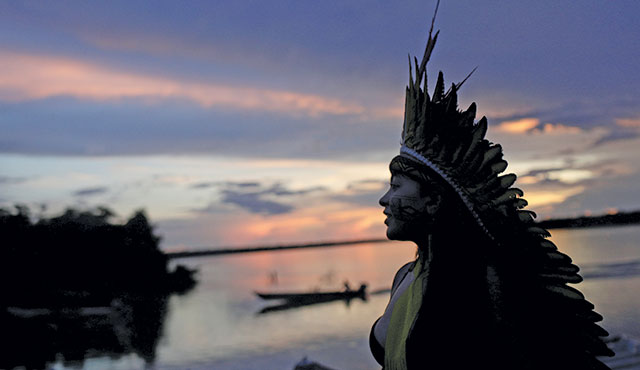LIMA, Peru (CNS) — Saying the world has much to learn from Amazonian indigenous peoples, Pope Francis declared the Catholic Church their ally in their struggle to protect the region’s forests and rivers.
In “Querida Amazonia” (Beloved Amazonia), the apostolic exhortation issued Feb. 12, the pope called on Catholics to respond to environmental destruction in the Amazon region with outrage and indignation while building networks of solidarity with its traditional inhabitants.
The document is Pope Francis’ response to recommendations made by participants in the Synod of Bishops for the Amazon, held in October 2019 at the Vatican.
With its often lyrical language, the exhortation takes another step toward a closer relationship with native peoples, which the pope launched in Peru in January 2017. At an encounter there with several thousand Amazonian indigenous people, Pope Francis asked his listeners to help church leaders understand their culture and their lives.
With the exhortation, the pope has made it clear that the church — and the world — must listen to them and recognize them as equals, said Moema Maria Marques de Miranda, a lay Franciscan who was an observer at the synod.
“After 500 years, indigenous peoples are recognized in their wisdom and their abilities. That is a paradigm change,” Miranda told Catholic News Service.
That message is woven into the document from the beginning, where Pope Francis describes four dreams. He says he dreams of an Amazonia that fights for the rights of indigenous peoples, an Amazonia that preserves its cultural riches, an Amazonia that preserves its natural beauty, and Christian communities that give the church “new faces with Amazonian features.”
That image of dreams has a double meaning. For most Westerners, dreams express hopes for the future, but for indigenous people, they transmit messages from God, just as they did for some Biblical figures, Miranda said.
Such dreams are visions “that connect with something very deep within the person,” said Medical Mission Sister Birgit Weiler, who works in Peru and was an expert at the synod. “It commits you to taking a new path.”
One message that stands out clearly in the exhortation, she said, is that the church sides with indigenous people who defend their lands against extractive industries like logging and mining or the encroachment of industrial-scale farming and ranching.
That is also a sign the church workers “have the backing of the pope” when they accompany communities in those struggles, she said. Such efforts sometimes draw criticism from others in the church, but the pope has made clear that “they can’t call you communist” for opposing industries or infrastructure projects that threaten communities, she said.
The exhortation “is a response from Pope Francis to the cry of pain of the Amazon, from its peoples, nations and indigenous organizations, Jose Gregorio Diaz Mirabal, coordinator of an umbrella organization of Amazonian indigenous groups, said in a statement released Feb. 12.

